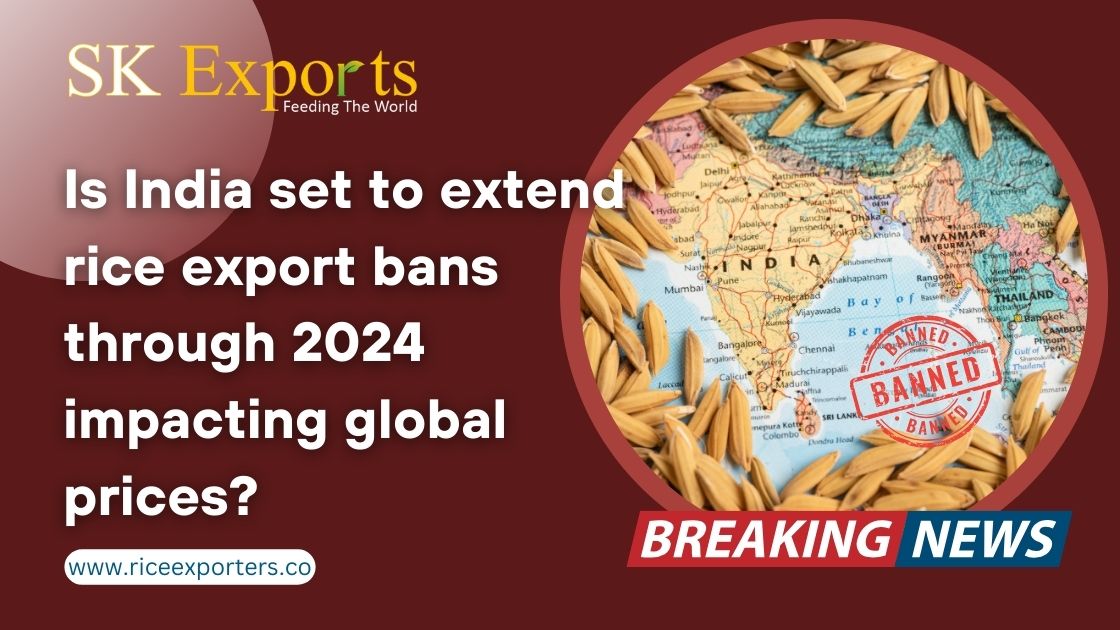Introduction:
In recent years, India has been a major player in the global rice market, often ranking among the top exporters of this staple food. However, speculation is rife that India might extend its ban on rice exports through 2024, which could have significant implications for global prices and trade dynamics. Let’s delve deeper into this topic to understand the potential repercussions and the factors driving this decision.
Current Scenario: India, known for its diverse varieties of rice including Basmati and non-Basmati, implemented export bans on certain varieties of rice in the past to ensure food security and stabilize domestic prices. These measures were often taken in response to fluctuating domestic production and supply-demand dynamics.
Reasons Behind the Extension:
Several factors contribute to the possibility of extending the export ban on rice:
-
Domestic Consumption Needs:
India, with its large population, has substantial domestic consumption requirements for rice. The government may prioritize meeting these needs over exporting rice to ensure food security for its citizens.
-
Monsoon Variability:
Rice cultivation in India heavily relies on monsoon rains. Variability in monsoon patterns can impact crop yields, leading to concerns about maintaining sufficient stocks for domestic consumption.
-
Pandemic-Induced Concerns:
The COVID-19 pandemic has highlighted the importance of food security for nations worldwide. India might choose to extend the export ban to mitigate potential supply chain disruptions and ensure ample food reserves in uncertain times.
Impact on Global Prices:
The extension of rice export bans by India could have far-reaching consequences on global rice prices and trade dynamics:
-
Price Volatility:
India’s absence from the global rice market as a major exporter could lead to increased price volatility. Import-dependent countries may face challenges in sourcing rice at stable prices, impacting consumers and food security programs.
-
Shift in Trade Patterns:
Traditional buyers of Indian rice may seek alternative sources to fulfill their requirements, leading to a shift in trade patterns. This could benefit other exporting nations such as Thailand, Vietnam, and Pakistan.
-
Opportunities for Competitors:
Extended export bans by India create opportunities for competitors to capture market share and strengthen their positions in the global rice trade. This could lead to increased competition and diversification of rice supply sources.
Government Policy and Industry Response:
The decision to extend export bans on rice in India is closely monitored by stakeholders, including farmers, exporters, policymakers, and international trade organizations. Government policies regarding export bans are often subject to review based on evolving domestic and global factors.
-
Farmers’ Concerns:
Indian farmers, especially those in rice-producing regions, may be impacted by export bans as they rely on export markets for income generation. Adequate support mechanisms and alternative livelihood options need to be considered to address their concerns.
-
Exporters’ Adaptation:
Exporters of Indian rice may need to adapt their strategies to navigate the changing trade landscape. Diversifying into other agricultural commodities or exploring domestic market opportunities could be viable options.
-
International Diplomacy:
The extension of export bans by India may prompt diplomatic discussions and negotiations among rice-exporting and -importing nations. Bilateral and multilateral agreements could play a crucial role in addressing trade imbalances and ensuring food security for all.
Impact on Global Food Security:
The extension of rice export bans by India has implications beyond price dynamics, extending to global food security considerations:
-
Risk of Shortages:
Import-dependent countries, particularly those with limited agricultural capabilities, may face shortages or increased food prices due to reduced availability of Indian rice in the global market.
-
Diversification Strategies:
To mitigate the risk of supply disruptions, importing nations may explore diversification strategies, including investing in domestic agricultural production or establishing trade agreements with multiple rice-exporting countries.
-
Humanitarian Concerns:
Vulnerable populations, including those in regions heavily reliant on rice as a staple food, could be disproportionately affected by disruptions in the global rice trade. International aid organizations may need to ramp up efforts to address potential food insecurity crises.
Sustainability Considerations:
The extension of export bans on rice by India also raises questions about the sustainability of agricultural practices and their long-term impact on the environment:
-
Water Management:
Rice cultivation is water-intensive, and prolonged bans on exports could lead to overutilization of water resources in rice-producing regions. Sustainable water management practices and alternative cropping patterns may need to be explored to mitigate environmental risks.
-
Land Use Patterns:
Continued reliance on rice monoculture for export purposes could exacerbate land degradation and biodiversity loss. Promoting agroecological approaches and diversifying cropping systems could enhance resilience and sustainability in agricultural landscapes.
-
Climate Resilience:
Climate change poses significant challenges to rice production, including increased frequency of extreme weather events and changing temperature and precipitation patterns. Investing in climate-resilient agricultural practices and crop varieties is crucial for ensuring long-term food security.
Conclusion:
The potential extension of rice export bans by India through 2024 raises pertinent questions about global food security, trade dynamics, and sustainability considerations. While prioritizing domestic needs is understandable, policymakers must carefully weigh the implications of such decisions on the broader agricultural ecosystem, international relations, and environmental sustainability. Collaboration among nations, supported by transparent policies and sustainable agricultural practices, is essential to address the challenges posed by the evolving dynamics of the global rice market.
